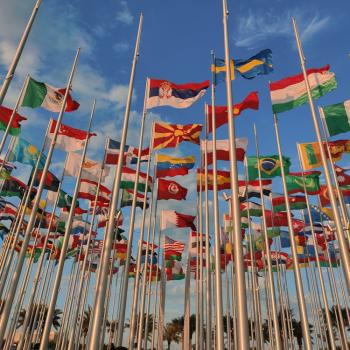
One of the most common, and also, insidious ideological errors which pervades politics is the notion that evil exists in and of itself, that it serves as its own principle, being self-subsistent. Once this notion is accepted, that someone or something which is deemed as absolutely evil, having no good in them, it is easy to be led to believe that such evil must be completely annihilated. History consistently shows us where this line of thought leads: people become agitated and swayed to do anything they can to make sure such evil is eradicated from the world, even if it means they must sacrifice their lives in doing so (such as seen in the Crusades). The more we think we are morally superior, the more we can be swayed to fall into this ideology, which is why it is hard to overcome; thus, in the modern age, though we think we have become so superior to those who preceded us, we have experienced one of the worst examples of this chain of thought, and the harm it causes, with the Holocaust. Jews were demonized and made to be seen as absolutely evil, that they were behind all the major crises of the modern age, and they would continue to be so as long as they continued to exist in the world; the Holocaust presented itself as the final solution to this problem, so that if the Jews were annihilated, then all the conspiracies they were behind would be stopped, and people would find the good the Jews prevented them from enjoying would once again be theirs. It should not need to be said, but sadly, it does, the reasons used to justify the Holocaust were utterly wrong: Jews are not evil, and they were not behind all kinds of conspiracies trying to prop themselves up in such a way to deny the good of everyone else.
After the Holocaust, we have said we would never let such madness reign again in the world. Sadly, the reality is that the kind of rhetoric and mentality which led to the Holocaust has not been undermined or stopped. Not only do we see the rise of antisemitism in the world once again, but we also see the xenophobia behind it being used to promote all kinds of hate and fear towards other groups, such as Muslims (or even Arab Christians), Latinos, and Haitians. Those who promote such hate expect us to agree with them, to join in with them in combating those they deem to be evil, and in doing so, see and promote ourselves as those who stand for all that is good and true.
Ultimately, what we see promoted, is a simple, dualistic rhetoric, one which is based upon the notion that there are two equal, and opposite principles one which is good, and one which is evil, principles which must fight against each other until only one of them is left in existence. We are led to believe ourselves as absolutely good, and those who we fight and resist as absolutely evil. While we might think it is possible for us (and others) to change sides, so we can join in with those who are evil, and those who are evil can repent and join in with the good, in general, the rhetoric is so generalized, those who are deemed good or evil are deemed such based upon characteristics which they cannot change (such as their ethnicity).
Dualism, despite being a heresy, has sadly influenced Christianity throughout history. It is not just Gnostics who were dualists, it is just that Gnostics tended to be more honest about their dualism. They said that the physical world was created by an evil principle, an evil god, which is why they rejected the world and all that was in it. They thought that the evil principle trapped many who were good in its domain, that is, good spirits were tapped in material prisons, and salvation was had when those spirits were finally set free, free to return to the good god who created them. Not all forms of dualism were so simple, as not all forms of dualism said the world itself was evil. However, the notion that there was an evil principle, and so evil could have an independent substance all its own, and so, the notion that there can be and is pure evil, is commonly accepted by many Christians. Once they do so, it is easy to convince them to believe someone represents such pure evil and so are to be resisted and eventually eliminated from existence. This is why Christians are often embraced by ideologues, as they believe they can use Christians for their own ideological (and political) ends, as they see Christians can quickly be radicalized by embracing their inherent dualistic tendencies.
It is this kind of dualistic rhetoric I see coming from those who talk about “intrinsic evils.” They want us to conflate “intrinsic evil” with “absolute evil.” They want us to be dualistic in the way we perceive the world so they can easily convince us to vote for those policies and politicians they claim are our last hope to fight against the evil which threatens the world today. If that means we might have to vote for those who might support some kind of “lesser evil” or that we must accept policies they promote which will hurt the common good (and our own private good), we are told it is just the kind of sacrifice we need to make in order to save the world.
Morally, and ontologically speaking, evil must not be understood as substantial, as an independent principle, but rather, as the end product of the corruption of some good. An “intrinsic evil” does not mean some sort of absolute evil, where the action involved, contains no good in it, but rather, that those actions deemed to be intrinsically evil always contain within them some corruption or hindrance of a good which should be promoted and supported. But, as evil comes from the corruption of some good, that proves that the evil is never an absolute in and of itself, a self-subsistent entity, but rather, all evil contains in it some form of the good which is being used and abused, a good which it would be best for us to discern and try to save instead of eliminate it by destroying the one who has done such evil. Those who engage dualism do not see the good, but only some evil, some evil which they want to eliminate, and in doing so, end up eliminating the good along with the evil, and so end up doing the work of the evil themselves.
Now, during elections, Catholics often hear of groups, and priest following such groups, who create lists of “intrinsic evils” which Catholics must not accept. They want us to equate voting for someone who acts on, supports, or at least allows for some sort of intrinsic evil, as supporting such evil ourselves. Catholic teaching, of course, does not tell us this. We are told we cannot promote and support a candidate based with a desire to promote and support a grave evil, but we can support candidates for reasons beyond those evils, if we think supporting and promoting them will lead to the greater good. Often, candidates will speak against particular evils, making us think they must be on the side of the good, but if we look to their policies, and what they plan to do, even if they are right about some things, they are wrong on so many others, that it is clear, if they gain power, they will only make things worse. When this is the case, we have a good reason to reject them and vote for someone else. We must always consider the greater good, and that means, we must always consider the common good, and if a candidate speaks against the common good, or ridicules it, we have a good reason to reject them, even if they claim to stand with us in relation to some particular goods.
Sadly, I have seen so many Catholics reject the notion that we must work for and support the common good; they say communism promotes such a position, and if communism supports it, it must be wrong. This, of course, is a fallacious argument, as it suggests that only communism promotes the common good (which is not true), but also, it suggests communism is absolutely evil so that nothing which is supports can be good, showing that dualism once again remains a guiding factor for political rhetoric.
Sadly, I fear we will get more dualistic rhetoric from priests the closer we get to the presidential election. Priests, who should know better, who should have been taught how and why such dualism is erroneous, follow and promote it in their sermons, using it as a means to indirectly promote their favored politicians or political parties in the pulpit. They might know they cannot directly tell their congregation who to vote for, but that does not stop them from doing so indirectly, by pointing out the evils of the politician(s) they do not like while pointing out the good of those they do like. Thus, when I read a priest writing in a church bulletin that he would not tell people who to vote for, but he would preach about the principles Catholics need to follow and how that relates to the concept of the “lesser of two evils,” I knew the priest was saying he would ultimately suggest, indirectly, who he think people should vote for, especially as the priest is highly active with right-wing groups like Legatus and gives the benediction to meetings where the president of Catholic Vote or Republican politicians were speaking.
The principle should not be “what is the lesser evil,” but rather, what is the greatest good, which is why elections, politics, must always be concerned with the common good, and not ignore it. For when the greater good is ignored, it is easily undermined, and evil be able to do its worst, creating structures of sin so that the good which has been ignored can and will continue to be ignored in the future.
Those who consider themselves as absolutely good, and their opponents as absolutely evil, will quickly accept immoral means to halt the evil they want eliminated; this is why they end up having no problems eliminating the freedom of or denying the human dignity of those they hate, until, at last, they accept the only solution to evil is the “final solution,” the one which seeks the destruction of those who have been tainted by the evil they hate. This is why we should look to see who employs dualistic rhetoric, and see what solutions they offer to the evil(s) they oppose; more often than not, they will show that their “purity” or the “good” which they hold to and use to justify themselves is not so good, even as the evil which they fight is not as evil as they claim. There will be more moral nuance than they allow, the kind which a proper ontology suggests, because proper nuance will recognize the various gradations of the good in the world. This moral nuance needs to be upheld so that we do not, as a society, end up repeating the mistakes of the past, the mistakes represented by the Holocaust.
*Personal Reflections And Speculations
Stay in touch! Like A Little Bit of Nothing on Facebook.
If you liked what you read, please consider sharing it with your friends and family!
N.B.: While I read comments to moderate them, I rarely respond to them. If I don’t respond to your comment directly, don’t assume I am unthankful for it. I appreciate it. But I want readers to feel free to ask questions, and hopefully, dialogue with each other. I have shared what I wanted to say, though some responses will get a brief reply by me, or, if I find it interesting and something I can engage fully, as the foundation for another post. I have had many posts inspired or improved upon thanks to my readers.












